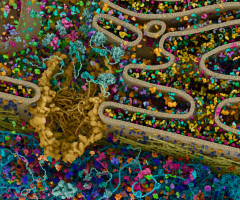
Researchers from Johns Hopkins University in collaboration with Insilico Medicine announce the publication of a new research paper titled "GULP1 regulates the NRF2-KEAP1 signalling axis in urothelial carcinoma" in Science Signaling.
The KEAP1-NRF2 pathway plays a key role in cancer prevention and protective cellular responses to oxidative and electrophilic stress.
In normal and premalignant tissues the signalling pathways activated by NRF2 prevent cancer initiation and progression, but in fully malignant cells disruption of the KEAP1-NRF2 pathway results in the transactivation of NRF2 target genes, consequently inducing cell proliferation and other phenotypic changes in cancer cells.
In this study, the researchers from John Hopkins University in collaboration with Insilico Medicine analyzed the protein GULP1 and its influence on the KEAP1-NRF2 pathway.
The results demonstrated that GULP1 knockdown leads to tumour cell proliferation in vitro and enhanced tumour growth in vivo, as well as the resistance to cisplatin treatment.
In parallel with decreased GULP1 expression, an increased expression of antioxidant genes in cisplatin-resistant cells was observed.
Furthermore, low or no expression of GULP1 was observed in most cisplatin non-responder cases.
Together, the findings demonstrate that GULP1 is a KEAP1 binding protein that regulates KEAP1-NRF2 signalling in UCB, and that promoter hypermethylation of GULP1 is a potential mechanism of GULP1 silencing.
"I am extremely happy to see authors from Insilico Medicine on this important paper by one of the world's top research groups. While KEAP1-NRF2 pathway is a major signalling axis in bladder cancer and other solid malignancies, targeting of this complex pathway remains challenging. Building on the knowledge generated in this study, we will use novel computational platforms developed at Insilico Medicine, such as Pandomics, and its integral component called Target ID, to focus on identifying and validating novel compounds that could inhibit this signaling network with high specificity, efficacy and safety", said Alex Zhavoronkov, PhD, CEO of Insilico Medicine.
Source: Insilico Medicine
We are an independent charity and are not backed by a large company or society. We raise every penny ourselves to improve the standards of cancer care through education. You can help us continue our work to address inequalities in cancer care by making a donation.
Any donation, however small, contributes directly towards the costs of creating and sharing free oncology education.
Together we can get better outcomes for patients by tackling global inequalities in access to the results of cancer research.
Thank you for your support.